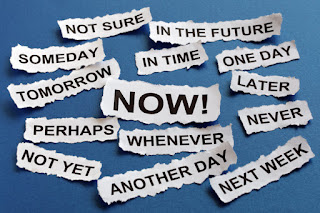The psychological impact of procrastination

Over the last few days we’ve been looking at the issue of procrastination, exploring why we procrastinate, and looking at strategies to help us stop doing it. One of the biggest challenges when trying to manage and overcome procrastination though is the psychological impact that procrastination can have on us. Depression/low mood and procrastination A 2007 study published in the psychological bulletin suggested that the link between depression/low mood and over-procrastination was very strong. This is perhaps not a surprising finding. If we procrastinate over a task, we may feel hopeless in our abilities or helpless to get things done. That in turn may lead to low mood and depressive symptoms. This can often turn into a bit of a cycle. The more we procrastinate, the more hopeless and helpless we feel, and the less likely to undertake tasks we know we need to do. In other words, we procrastinate more. OCD and procrastination Procrastination has also been ...







